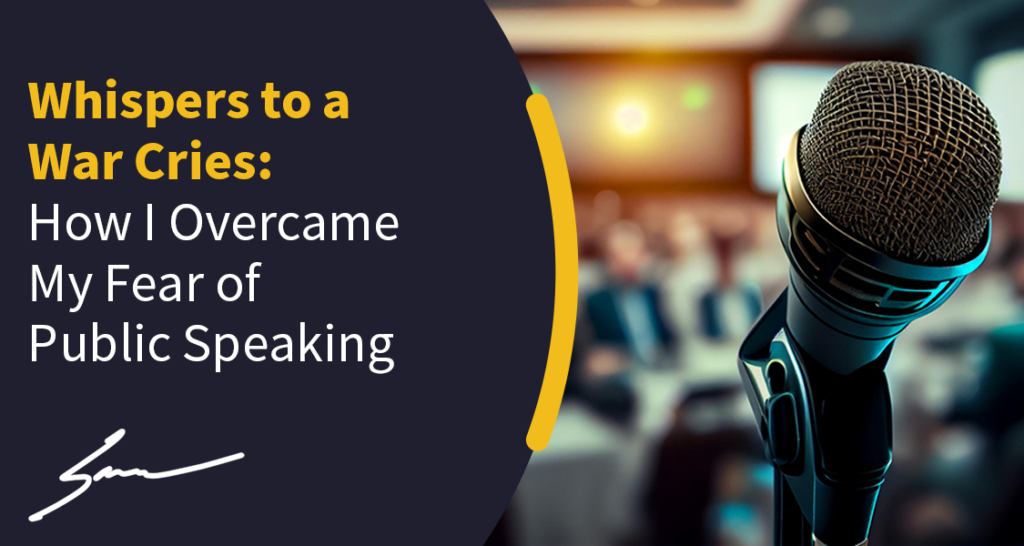I remember my first nerve-wracking experience giving a speech when I was a student in my second or third year of university.
I had been preparing a presentation with someone who was a professional in the field.
Everything was going smoothly until that person backed out at the last minute, and I found myself under intense pressure to deliver the speech alone.
Since I had created the deck, the content itself wasn’t an issue at all.
The issue was MY FEAR!
My fear of judgment.
My fear of speaking out.
And my fear of being wrong in front of hundreds of people.
My father gave me valuable advice back then that I still hold close to my heart.
He told me, ‘Remember, people here are here to listen to you. They’re giving you time because they believe you know the topic better than they do.”
He made me realize that, among everyone in that room, I knew the topic best. That reminder gave me just enough confidence to get through the speech.
Well, it wasn’t the best speech I made, but it surely got me started on my journey of public speaking.
Hi, I’m Sameer Ahmed Khan, CEO of Social Champ, and I started my journey of public speaking as a filler!
I’ll give myself some credit for going from being a last-minute substitute to giving talks internationally, but the journey wasn’t as easy as it might seem!
Here are a few tips for anyone currently struggling with public speaking. These are practices I use myself, so I can vouch that they’re more than just generic advice you’ll find online.
-
You Owe Your Audience Your Best Performance
In public speaking, there’s a common belief that speakers are there to impart knowledge, information, or value through their talk.
Many speakers see themselves in a position of superiority, assuming people are there solely to listen to them (which, to some extent, they are)!
However, my perception of this is slightly different. I tend to think that I’m no superior position, my audience is!
I believe that my audience has taken time out to come and listen to my talk. They could be doing a hundred useful things in that time but they choose to spend it on me.
If they don’t like my speech they have all the right to walk out, but they choose to sit through it and this thought makes me humble.
I want to make their time worthwhile because I believe that I owe them something for their time and effort to come here and listen to me.
This belief makes me want to work harder on my speeches and deliver the best I can!
-
You Must Know And Understand Your Audience
Now, here’s one generic tip, but what can we say, sometimes even these tips are helpful!
By knowing your audience, I mean that you should not be giving a speech about investments and stocks to an audience of startups.
Similarly, you cannot give startups tips to an experienced audience who have established businesses.
Know your audience and give them what they’re there for.
If you are delivering a speech for students, curate it according to their experiences and don’t talk about terminologies they don’t understand yet. Add anecdotes they can relate to, find a common ground with them. Trust me, you’ll capture their attention.
Stand on the same level with your audience and remember that you’re not there to tell them how well-versed and successful you are by talking about things they don’t care about.
Create your speech according to the audience to gain their interest!
-
Pray—It Helps!
This is something very personal but I always pray before I go up on the stage for my speech.
There’s a Du’aa for public speaking that translates to “My Lord, expand for me my chest [with assurance] and ease for me my task and untie the knot from my tongue (so) that they may understand my speech.”
I have made this my practice over the years and it really helps me get a grip and calm my mind.
Now, this might be something that not everyone will try but if you wish to try everything there is to make your speeches work, you can try this!
-
Use Humor— Only If It Lands!
Humor is my shield to fight against awkwardness and it’s also an effective way to keep your audience invested!
If you keep giving them content without any break, your audience will eventually start losing interest and it will also feel like you’re sleepwalking through your speech.
Combining humor and content together is a good way to get your audience’s focus back.
For me, the ideal mix of both is 40% of humor and 60% of content.
This allows you to deliver my message without any problem and I get to keep my audience interested with my wit and relatable jokes.
Yes, the jokes should also be relatable because you’d feel horrible if your jokes don’t land, so this point also relates to that generic advice, know your audience!
In Conclusion
My journey to conquering my fear of public speaking has been eye-opening. I’ve learned to face my fears head-on through self-reflection, practice, and a few deep breaths.
While focusing on my material and challenging specific worries, I have gained confidence in speaking in front of others.
Each step, from finding a safe space to practice to embracing moments of silence, has been crucial to my growth.
Remember, fear is just a hurdle, not a roadblock. With determination and a willingness to learn, anyone can overcome their fear of public speaking. So, take that leap, find your voice, and let your words be heard.
